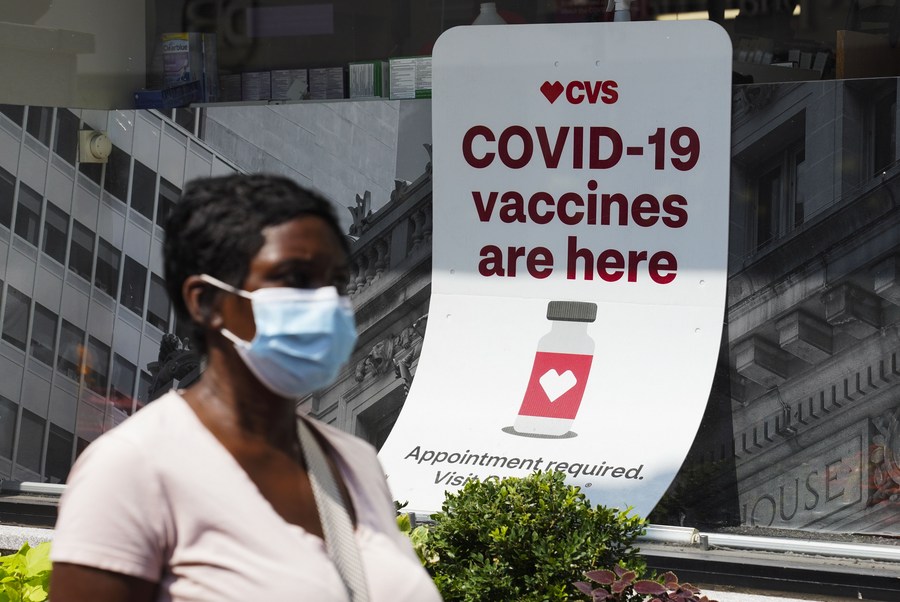Failure to control COVID-19 unavoidable for "Divided States of America"
The COVID-19 pandemic is just deteriorating in the U.S. again, leading to a sharp rise in infection numbers in the country. Even so, the Republicans and Democrats are still debating over whether mask mandates are necessary, and recriminations between the federal and local governments on pandemic control even became a hotspot issue for the public.

A man walks past a sign of COVID-19 vaccination at a pharmacy in New York, the United States, Aug. 11, 2021. (Xinhua/Wang Ying)
Such chaos mirrors the institutional ineffectiveness of the United States. Given fierce party rivalry, extreme political polarization and huge social divide, the institutional design which the U.S. has long been proud of has turned into "vetocracy." As the United States of America gradually becomes the "Divided States of America," a failure in pandemic control is just inevitable.
The rampant pandemic has forced Washington to declare major disaster in all 50 states, a severe situation that requires the U.S. to pool all public health resources and mobilize all social sectors. However, the two political parties and authorities at different levels are not working together to fight the virus, making no effort to advance nucleic acid tests, implement mask mandate, advocate social distancing, execute home quarantine order, promote vaccination drive, enhance distribution of medical strategic reserves, or implement emergency relief plan. On the contrary, they are seeking private profits with the so-called checks and balances, placing political interests over the fight against the pandemic. As a result, over 620,000 citizens have died because of the pandemic so far. This is exactly an "American failure," just as what U.S. media called it. Accountability is essential to the U.S. government system, said Times magazine in an article.
U.S. politicians have always taken pride in the separation of powers, as they believe it is a model mechanism for checks and balances and self-correction. However, the anti-science and unwise practices of Washington with regard to domestic affairs, diplomacy and international anti-pandemic cooperation have fully proved that the mechanism was not correcting mistakes, but serving as a stage of power struggle amid the increasingly fiercer partisan fight.
Last year, the Democrats and Republicans, out of their long-built "political instincts," both associated pandemic control measures with the presidential election that was about to happen. What came first to their minds was not how to control the virus or how to save more lives, but how they could win the election and shift responsibilities.
Since the pandemic was identified in the U.S., the two parties have always been arguing over various topics and thus missed the window period. Even the judicial system, which is claimed to be "independent" in the separation of powers mechanism, is involved in partisan fight. The system failed to set a good example for handling public health crises, said an American scholar.
It's nothing strange for U.S. federal, state and local governments, controlled by different parties, to rake up each other's faults and shift responsibilities. Under the previous administration, conflicts broke out frequently between the federal government controlled by the Republicans and the blue states. They not only competed for anti-pandemic supplies, but also implemented pandemic control measures that were poles apart.
It fully revealed the nature of American politicians - maximizing their private political gains under the fixed mechanism. Under the incumbent administration, the federal government controlled by the Democrats is still having a beef with the red states.
Fierce political wrangling is continuing in each U.S. state, too. In July last year, the Georgia governor, who is a Republican, dropped a lawsuit against the Democrat mayor of the state's largest city Atlanta, trying to stop the mask mandates enacted by the later. In Texas today, mask orders implemented by Dallas are also facing legal challenge from the state government. "The American system is very decentralized," said Fareed Zakaria, a U.S. journalist, who believes it is a reason for the country to have failed in pandemic control.
Pandemic control calls for joint efforts. The "Divided States of America" would definitely see more chaos in its fight against the virus. There's one thing that is certain about pandemic control in the U.S. - U.S. politicians care more about political interests than people's lives and health. It is an irony to the so-called "democracy" and "human rights" they have always advocated.
American political scholar Francis Fukuyama said the pandemic has exacerbated political polarization in the U.S., and the polarization might worsen as time goes by. At present, U.S. politicians are still turning a blind eye to the divide in the country. The blame game would only make U.S. politics more polarized, and society more separated. Because of it, the U.S. citizens have to pay a larger price, and the world has to face bigger threats from the pandemic.
(Zhong Sheng is a pen name often used by People's Daily to express its views on China’s foreign policy and international affairs.)
Photos
Related Stories
- Flawed systems, mismatched values doom U.S. to COVID-19 fiasco
- Inflatable labs speed up COVID-19 testing in east China's Yangzhou
- China’s open and transparent approach says no to US politicization of virus origin tracing
- Over 1.86 bln doses of COVID-19 vaccines administered in China
- Chinese mainland reports 13 new locally transmitted COVID-19 cases
Copyright © 2021 People's Daily Online. All Rights Reserved.










